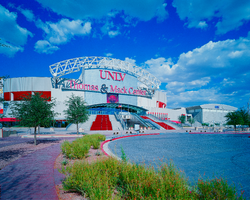Search the Special Collections and Archives Portal
Search Results
Howard Heckethorn oral history interview
Identifier
Abstract
Oral history interview with Howard Heckethorn conducted by Richard Eitland on February 15, 1979 for the Ralph Roske Oral History Project on Early Las Vegas. Mr. Heckethorn describes going to school in the early days of Las Vegas, Nevada. He also talks about many notable teachers he had, as well as the development of the Las Vegas area. Heckethorn also discusses his arrival to Las Vegas, Nevada in 1930, and recalls the Old Mormon Fort, El Rancho, The Last Frontier, and the tourism that gambling brought to the city. Heckethorn discusses the 1960s, and the impact Howard Hughes had in the development of hotels and casinos.
Archival Collection

Lee White oral history interview
Identifier
Abstract
Oral history interview with Lee White conducted by Claytee D. White on May 18, 2021 for African Americans in Las Vegas: a Collaborative Oral History Project. Lee White played professional football for the New York Jets, Los Angeles Rams, and San Diego Chargers. A promising career as a first round draft pick resulted in an injury in his first professional game. He retired from football at the age of 28 and moved back to Las Vegas where he had grown up on the Westside. Lee entered the hotel and casino industry as a dealer, retiring twenty-five years later as a Vice President of Casino Operations. His career in the tourism industry included work at the Sands, MGM, Desert Inn, and the Tropicana.
Subjects discussed include: Westside School, Weber State College, and the Sahara Hotel and Casino
Archival Collection
Hanford Searl oral history interview
Identifier
Abstract
Oral history interview with Hanford Searl conducted by Dennis McBride on November 02, 1996 for the Las Vegas Gay Archives Oral History Project. Searl discusses being gay and the struggles he faced in religion and university before moving to Las Vegas, Nevada.
Archival Collection

Felipé Goodan interview, April 1, 2019: transcript
Date
Archival Collection
Description
Interviewed by Monserrath Hernández. Rabbi at Temple Beth Sholom since 1998, Felipe Goodman is a native of Mexico City. He identifies as a Mexican Jewish American, and shares the complexities of these.
Text
Gene Collins oral history interview
Identifier
Abstract
Oral history interview with Gene Collins conducted by Claytee White on August 31, 2000 for the Boyer Early Las Vegas Oral History Project. In this interview Gene Collins speaks about how his family lived in West Las Vegas, Nevada, which at the time was a thriving community where African Americans owned their own businesses. Gene talked about how the assassination of Martin Luther King Jr. led to a riot and how it inspired him to run for state assemblyman where he was instrumental in getting the Martin Luther King Jr. holiday bill to pass. He spoke about his time as the president of the Las Vegas National Association for the Advancement of Colored People (NAACP) where he addressed the lack of African Americans in the gaming industry in addition to filing the largest equal employment opportunity commission suit filed in the state of Nevada against the Mirage Hotel and Casino.
Archival Collection
Irma Varela oral history interviews
Identifier
Abstract
Oral history interviews with Irma Varela conducted by Barbara Tabach on December 04, 2018 and March 05, 2019 for the Latinx Voices of Southern Nevada Oral History Project. In these interviews, Varela talks about her upbringing in Zacatecas, Mexico, her move to Las Vegas, Nevada in 1989, and how religion has affected her life. She also describes her work as the Cultural Program Supervisor at Winchester Community Center, and her career in preserving Hispanic cultural traditions in Las Vegas. Varela talks about being an active leader in local Las Vegas organizations and events such as the Mexico Vivo Dancing Company, Dia de los Muertos (Day of the Dead) celebrations, and the International Food and Folklife Festival.
Archival Collection
Rosemary A. Vassiliadis oral history interview
Identifier
Abstract
Oral history interview with Rosemary Vassiliadis conducted by Stefani Evans and Claytee White on April 12, 2017 for the Building Las Vegas Oral History Project. Vassiliadis discusses her career as a budget analyst in Las Vegas, Nevada and as the first female Director of Aviation at the McCarran Airport. She also discusses managing the airport in the days after the September 11, 2001 terrorist attacks.
Archival Collection
Interview with Robert Allen
Identifier
Abstract
Oral history interview with Robert Allen Jr. conducted by Carlton Kelley on March 20, 1978 for the Ralph Roske Oral History Project on Early Las Vegas. Robert Allen discusses his career in acting and his role in the entertainment business in Las Vegas, Nevada. Allen then discusses the growth of Las Vegas, the role of mining in Southern Nevada, and the work of instrumental political figures. Allen also discusses the role of the gaming industry, the availability of recreational activities, the modes of transportation available to locals, television and movie productions in which he was involved, and dining options for Las Vegas locals.
Archival Collection
